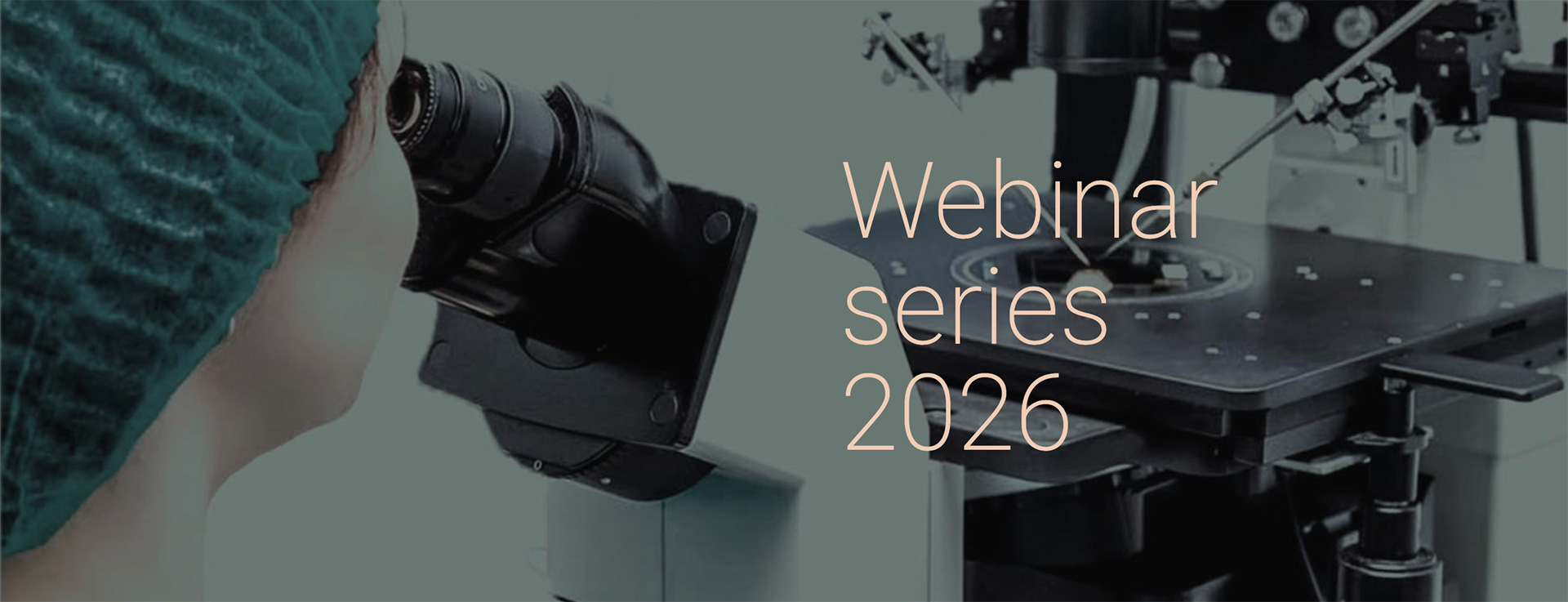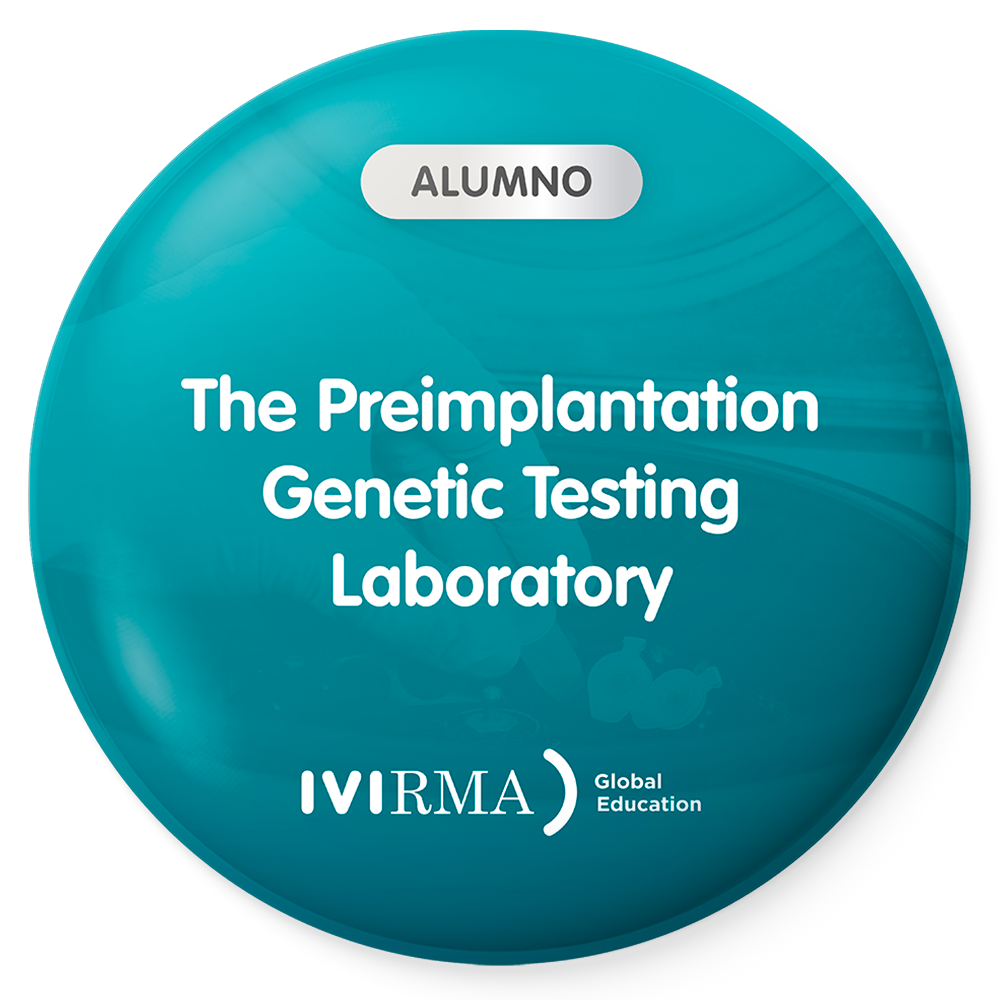Online course in The Preimplantation Genetic Testing Laboratory
AREA: Assisted Reproduction, Research
LANGUAGE: English
PLACES: 15
STUDENTS: 0/15 (0%)
START DATE & END:
14/07/2026 – 11/08/2026
MODALITY: Online
CENTER: IVIRMA Global Education
Online course in The Preimplantation Genetic Testing Laboratory
AREA: Assisted Reproduction, Research
LANGUAGE: English
PLACES: 15
STUDENTS: 0/15 (0%)
START DATE & END:
14/07/2026 – 11/08/2026
MODALITY: Online
CENTER: IVIRMA Global Education
Online course in The Preimplantation Genetic Testing Laboratory
AREA:
LANGUAGE: English
ProgramData

Start date and end:
14/07/2026 - 11/08/2026

Enrollment:
350 €

Location:
IVIRMA Campus

Hours:
20 theoretical
Self-paced study

Type:
Online courses

Organizer center:
IVIRMA Global Education
Description
About 50 years ago, the first human conceptions carrying aneuploidies (numerical chromosome abnormalities) were identified and since then research has focused on three basic questions:
1- Frequency of aneuploidies and clinical relevance
2- Origin of excess / defective chromosomes
3- Mechanisms that produce aneuploidies
Most aneuploid pregnancies end in miscarriage during the first trimester of pregnancy, but in some cases (trisomies on 13, 18, 21 and sex chromosomes, as well as monosomy on X chromosomes) are compatible with life and represent the main causes of babies born with birth defects and mental retardation.
In this course, we will define different chromosome abnormalities and genetic diseases to describe the incidence and origin. We will focus on the genetic aspects that have implications for human fertility and reproductive options in couples carrying genetic diseases and at risk for chromosomal abnormalities. Among the reproductive options, we will highlight the possibility of performing a biopsy on embryos obtained from in vitro fertilization and analyzing the genetic and / or chromosomal load to transfer healthy embryos to the maternal uterus within a preimplantation genetic testing program.
We will also study Genomic and Systems Medicine applied to Assisted Human Reproduction, focusing on the creation of predictive computational tools for diagnosis.
Important information:
The online course will be carried out through the e-learning platform: IVIRMA Campus. The student will receive a message with the access information and credentials 24/48 hours before the start of the course.
IVIRMA Campus can be accessed from Windows computers (7, 8 or 10) or Mac, using Chrome or Firefox in its last three versions. Access from mobile devices is not supported and does not ensure the correct operation of the course.
To successfully complete the training and obtain the corresponding certificate, the student must obtain a percentage greater than or equal to 70% of correct answers in the final evaluation. To do this, you will have two opportunities to take the exam.
Biomedical Professionals, Biotechnologists, Andrologists and Embryologists
Academic information
Competencies
Learning outcomes expected to be acquired by the student at the end of the course:
1. Apply genetics knowledge in reproductive medicine.
2. Identify the cytological description of the male and female gametes considering their cellular physiology.
3. Analyse the relevance and characteristics of preimplantation genetic diagnosis techniques.
4. Identify the techniques that allow the diagnosis and selection of the human embryo free of chromosomal and genetic abnormalities.
5. Systematize the tasks that are developed in a preimplantation genetic diagnosis laboratory.
6. Develop specialized knowledge of computer software tools that help to interpret results.
Course Coordination:
Patricia DĂaz Gimeno
Program
1. Introduction to genetics and medical genomics
2. Meiosis, oogenesis and spermatogenesis
3. Post-fertilization mitotic divisions and embryonic mosaicism
4. Embryo biopsy: update
5. PGT for monogenic disorders and carrier screening
6. PGT for chromosome abnormalities and chromosome rearrangements
7. The PGT-A controversy
8. Future directions for the molecular assessment and diagnosis of embryos
9. Genetic Counseling in the infertile/sterile couple
10. Reproductive genomics: basic concepts, consortia, databases and genome datasets
11. Techniques for genomic analysis: preliminary, exploratory and functional
12. Techniques for systems genomic analysis: network modelling
13. Genomic tools for computational prediction and clinical application
14. Genetic Diagnosis of the Endometrial Factor: controversies
15. Analysis of genome variants: prioritization of clinical biomarkers and gene panels in the diagnosis
16. Systems Reproduction Medicine: the big data era
Cancellation and Refund Policy
Once the course has started, enrollment cancellation will not be possible, and no refunds will be issued under any circumstances.
Theoretical-practical courses are designed as an indivisible training unit; therefore, no refunds will be granted once the course has begun, even if the practical component has not yet started.
Course Completion
A course will only be considered successfully completed when the student has fully completed the entire program. If the course includes a practical component, it will not be deemed completed unless that component has been fully carried out.
No certificate of completion or attendance will be issued if the student has not completed all the activities included in the course program. Under no circumstances will certificates be issued for partial completion of either the theoretical or practical parts of the course.
Related courses

Online
Molecular control of follicular dominance and atresia – Casarini
Start: 17/02/2026
Webinars
Course fee:
Free

Online
Past, present and future of sperm assessment -Garrido
Start: 18/02/2026
Webinars
Course fee:
Free

Online
Embryo plasticity: cellular and molecular aspects – Coticchio / Ottolini
Start: 24/02/2026
Webinars
Course fee:
Free
14/07/2026 – 11/08/2026
20 theoretical
IVIRMA Campus
350 €
Program Data
IVIRMA Campus
This course is accredited by the European Accreditation Council for Continuing Medical Education (EACCME).Once course is completed you will be awarded with 20 ECMEC´s credits. More information in FAQ´s.
Intended for
Biomedical Professionals, Biotechnologists, Andrologists and Embryologists
Description
About 50 years ago, the first human conceptions carrying aneuploidies (numerical chromosome abnormalities) were identified and since then research has focused on three basic questions:
1- Frequency of aneuploidies and clinical relevance
2- Origin of excess / defective chromosomes
3- Mechanisms that produce aneuploidies
Most aneuploid pregnancies end in miscarriage during the first trimester of pregnancy, but in some cases (trisomies on 13, 18, 21 and sex chromosomes, as well as monosomy on X chromosomes) are compatible with life and represent the main causes of babies born with birth defects and mental retardation.
In this course, we will define different chromosome abnormalities and genetic diseases to describe the incidence and origin. We will focus on the genetic aspects that have implications for human fertility and reproductive options in couples carrying genetic diseases and at risk for chromosomal abnormalities. Among the reproductive options, we will highlight the possibility of performing a biopsy on embryos obtained from in vitro fertilization and analyzing the genetic and / or chromosomal load to transfer healthy embryos to the maternal uterus within a preimplantation genetic testing program.
We will also study Genomic and Systems Medicine applied to Assisted Human Reproduction, focusing on the creation of predictive computational tools for diagnosis.
Important information:
The online course will be carried out through the e-learning platform: IVIRMA Campus. The student will receive a message with the access information and credentials 24/48 hours before the start of the course.
IVIRMA Campus can be accessed from Windows computers (7, 8 or 10) or Mac, using Chrome or Firefox in its last three versions. Access from mobile devices is not supported and does not ensure the correct operation of the course.
To successfully complete the training and obtain the corresponding certificate, the student must obtain a percentage greater than or equal to 70% of correct answers in the final evaluation. To do this, you will have two opportunities to take the exam.
Skills
Learning outcomes expected to be acquired by the student at the end of the course:
1. Apply genetics knowledge in reproductive medicine.
2. Identify the cytological description of the male and female gametes considering their cellular physiology.
3. Analyse the relevance and characteristics of preimplantation genetic diagnosis techniques.
4. Identify the techniques that allow the diagnosis and selection of the human embryo free of chromosomal and genetic abnormalities.
5. Systematize the tasks that are developed in a preimplantation genetic diagnosis laboratory.
6. Develop specialized knowledge of computer software tools that help to interpret results.
Program
Program
1. Introduction to genetics and medical genomics
2. Meiosis, oogenesis and spermatogenesis
3. Post-fertilization mitotic divisions and embryonic mosaicism
4. Embryo biopsy: update
5. PGT for monogenic disorders and carrier screening
6. PGT for chromosome abnormalities and chromosome rearrangements
7. The PGT-A controversy
8. Future directions for the molecular assessment and diagnosis of embryos
9. Genetic Counseling in the infertile/sterile couple
10. Reproductive genomics: basic concepts, consortia, databases and genome datasets
11. Techniques for genomic analysis: preliminary, exploratory and functional
12. Techniques for systems genomic analysis: network modelling
13. Genomic tools for computational prediction and clinical application
14. Genetic Diagnosis of the Endometrial Factor: controversies
15. Analysis of genome variants: prioritization of clinical biomarkers and gene panels in the diagnosis
16. Systems Reproduction Medicine: the big data era
Coordinators
Cancellation and Refund Policy
Once the course has started, enrollment cancellation will not be possible, and no refunds will be issued under any circumstances.
Theoretical-practical courses are designed as an indivisible training unit; therefore, no refunds will be granted once the course has begun, even if the practical component has not yet started.
Course Completion
A course will only be considered successfully completed when the student has fully completed the entire program. If the course includes a practical component, it will not be deemed completed unless that component has been fully carried out.
No certificate of completion or attendance will be issued if the student has not completed all the activities included in the course program. Under no circumstances will certificates be issued for partial completion of either the theoretical or practical parts of the course.


